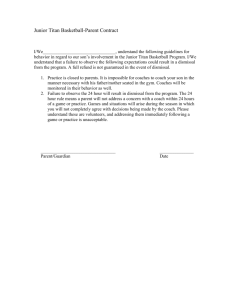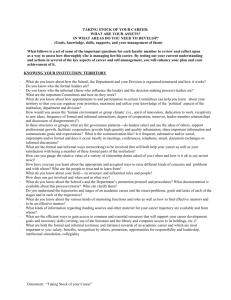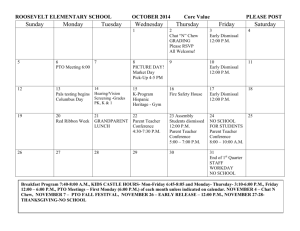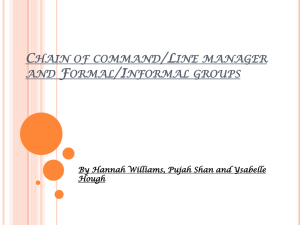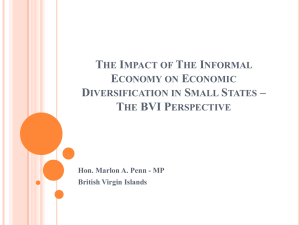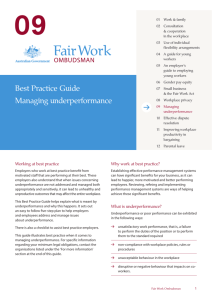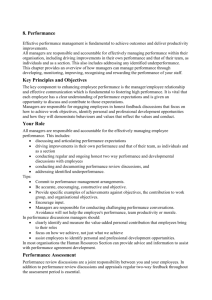Managing Staff Performance
advertisement
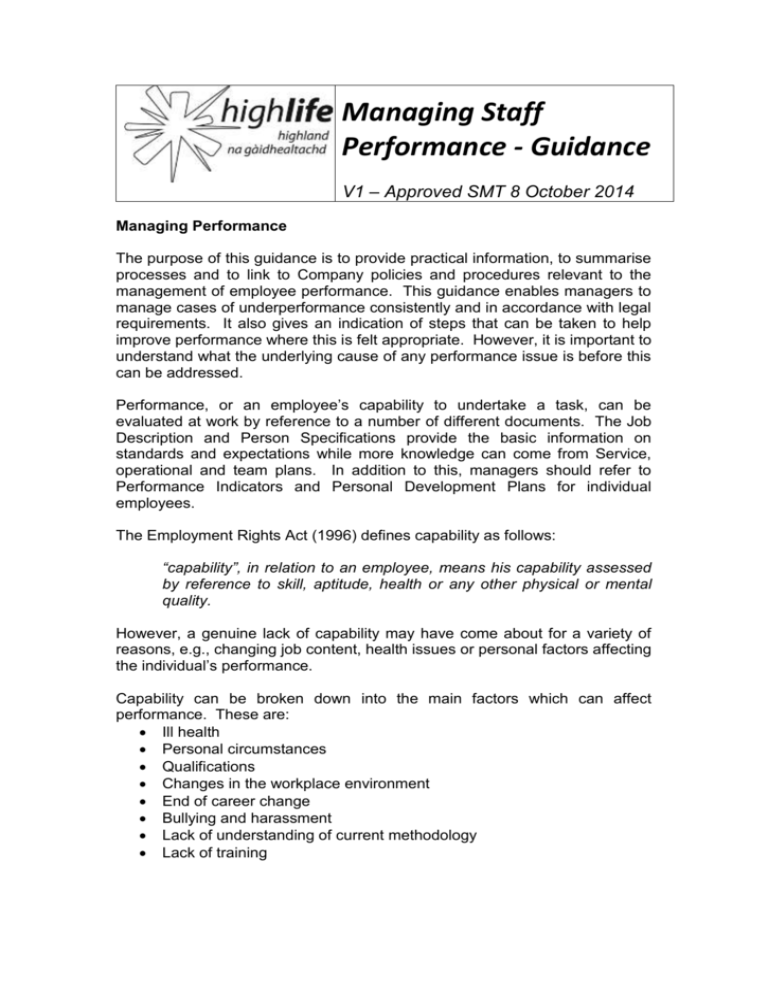
Managing Staff Performance - Guidance V1 – Approved SMT 8 October 2014 Managing Performance The purpose of this guidance is to provide practical information, to summarise processes and to link to Company policies and procedures relevant to the management of employee performance. This guidance enables managers to manage cases of underperformance consistently and in accordance with legal requirements. It also gives an indication of steps that can be taken to help improve performance where this is felt appropriate. However, it is important to understand what the underlying cause of any performance issue is before this can be addressed. Performance, or an employee’s capability to undertake a task, can be evaluated at work by reference to a number of different documents. The Job Description and Person Specifications provide the basic information on standards and expectations while more knowledge can come from Service, operational and team plans. In addition to this, managers should refer to Performance Indicators and Personal Development Plans for individual employees. The Employment Rights Act (1996) defines capability as follows: “capability”, in relation to an employee, means his capability assessed by reference to skill, aptitude, health or any other physical or mental quality. However, a genuine lack of capability may have come about for a variety of reasons, e.g., changing job content, health issues or personal factors affecting the individual’s performance. Capability can be broken down into the main factors which can affect performance. These are: Ill health Personal circumstances Qualifications Changes in the workplace environment End of career change Bullying and harassment Lack of understanding of current methodology Lack of training Managers are responsible for defining good performance within their own teams and at individual level. They are responsible for communicating expectations to staff through example, induction, team briefings, 1 to1s and written documentation. Many of the factors affecting performance can be short-term and it is often, therefore, possible to support employees to achieve improvements in performance. Nothing in this guidance is intended to prevent the normal process of supervisory control where managers allocate work, monitor performance, draw attention to errors and poor quality and, as importantly, highlight work done well. Staff should be aware of the standard of performance expected, should be open and honest about their own capability issues and discuss these concerns with their manager. It is important that staff receive support and encouragement to improve rather than receiving punitive action. Managers need to have confidence in staff, allowing staff the freedom to undertake their duties, providing support if performance falls short of the required standard. Staff must be able to acknowledge difficulties with their performance, secure in the knowledge that positive action will be taken quickly in a supportive and encouraging manner. Cases of underperformance should be identified early on and then examined to try to understand the underlying causes, if any. However, it should also be borne in mind that where contributory factors relate to an employee’s private/personal life they may not wish to discuss these issues with their line manager. Managers must ensure that several basic principles are applied for each employee in their team; All staff need their performance measured; Staff should receive regular and appropriate review meetings; All agreed measured outcomes need to be monitored and reviewed; Any unmeasured outcomes should be discussed and any issues arising should be tackled ; Formal appraisal meeting must take place and informal reviews are recommended at regular intervals. Employees who are not performing to the required standard can have a lasting and damaging effect on service delivery as well as on motivation and job satisfaction for the employee, their colleagues and the manager. It is important for managers to deal with any performance issues at an early stage as allowing employee underperformance to continue unchallenged implies to the employee concerned and to colleagues that their level of performance is acceptable. Feedback and Improvement If an employee’s performance reaches or exceeds the required standard it is important that this is fed back to the employee. It is just as important to celebrate success as it is to raise concerns. Managers should also use examples of good practice and give meaningful feedback in order that employees know the level of their performance. Where a manager has any concerns about the level of performance of an employee the issue should be dealt with by way of informal discussion with the employee in the first instance. The aim of the informal discussion should be to make it clear to the employee, by reference to specific examples, why it is considered that their performance is falling short of the required standards. The employee must be given the opportunity to consider and to comment on the performance concerns identified. It may be that there is a reasonable explanation for the problems that have occurred. The success of the informal approach depends on the co-operation of the employee. This includes the employee accepting that their performance is falling short of the required standards. Where the employee does not accept that they are under performing or they are not prepared to co-operate then a more formal approach will require to be taken. Informal Performance Management If any performance issue has been identified, It is important that the manager determines whether there is a capability issue and if the matter should be dealt with under this policy, and if so the following should be considered: Clarify to the employee what the issue is; Specify as to what improvements are required; Clarify what support (including training, etc.) can be provided; Agree with the employee a reasonable timescale for achieving improvements Ensures that the employee understands what the issue is and the actions that are required. Set a review date The purpose of the informal discussion should be to establish if there is a reason for the employee’s performance falling below the required standard. The manager must constantly bear in mind that the aim is to assist the employee to improve to an acceptable standard. It is crucial that as many aspects of the problem as possible, as perceived by the employee, are unearthed. This will require a sensitively handled discussion free from interruption, conveying the manager’s undivided attention, aimed at establishing an atmosphere of trust and open discussions. During this stage the employee has the right to involve their staff representative. The informal approach will normally have as an outcome the agreement of an action plan for improvement with agreed specific, measurable and time bound targets. The agreed action plan should include dates for reviewing progress and any management interventions necessary to facilitate an improvement in performance. Progress against the action plan should be reviewed with the employee and a decision taken as to whether adequate improvements have been achieved, more time is required or a more formal approach requires to be taken. The Management of Underperformance Flowchart summarises the process for informally managing under performance. Formal Performance Management Where an informal approach fails to deliver adequate improvements in performance, the employee does not accept that their performance is falling below an acceptable standard or where, despite considerable support underlying causes for the employee’s under performance are not being resolved, a formal performance management approach should be adopted. The applicable procedures are contained in the Attendance Guidance for cases involving ill-health and disability and the Disciplinary Procedure for other cases. The aim of the formal performance management process is to enable discussion and agreement between manager and employee of the specific performance problems, any potential underlying causes and to identify an action plan with time scales necessary to help the employee to improve their performance. Discussion should not be confrontational and it should be clear to the employee that the Company’s sole interest is in helping the employee to achieve an adequate standard of performance of the duties of their job. It should also be made clear to the employee that the Company is willing to do all that it reasonably can to assist the employee to improve, including providing help where personal factors are influencing the employee’s performance. Nevertheless, the employee should also understand that continued under performance will not be tolerated in the long term and that there is an escalation process entailing consequences for future employment should under performance continue. The following essential elements of the formal performance management process must be observed: The employee should be provided with written details of the purpose of formal meeting, including details of the concerns to be discussed and the relevant amount of notice of the meeting, ie 5 working days. The employee must be notified in writing of their right to be accompanied to formal meetings by a colleague or trade union representative; Following the meeting, the employee should be given details, in writing, of the performance improvements required, the management interventions that will be made to support performance improvements, timescales for improvement and when and by whom progress will be reviewed. An action planning process is recommended to identify and agree improvements and timescales. The meeting action log contains a model action plan for recording outcomes of performance management meetings; The employee should be in no doubt about what it is they need to do to reach an acceptable standard of performance; The employee should be given adequate opportunity and support to improve their performance; Where insufficient progress is made within a reasonable timescale and no further reasonable management interventions can be made to support performance improvements, the employee should be warned, in writing, that a continued failure to improve their performance to an acceptable level may ultimately lead to their dismissal on the grounds of capability; Should dismissal on the grounds of capability become a possibility the employee (and their representative) should be invited, in writing, to attend a hearing at which dismissal on the grounds of capability will be considered. Reasons for considering dismissal should also be set out in writing; In the event that an employee is dismissed on the grounds of capability written reasons for dismissal should be provided and the employee should be notified of their right of appeal against dismissal. It is not possible, nor desirable to define how long the formal performance management process should last. Nor is it possible to define how many meetings should take place with the employee before the ultimate sanction of dismissal is considered. However, as a guide, where there is insufficient evidence of improvements in performance over the course of three review meetings and all reasonable and practical management interventions have been exhausted then consideration may be given to dismissing the employee on the grounds of capability. In such circumstances the advice of HR must be sought.

